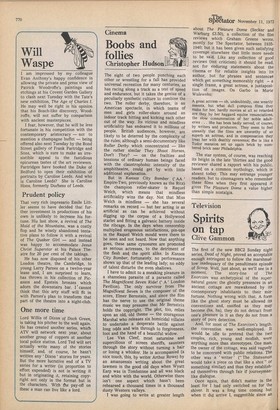Boobs and follies
Christopher Hudson
The sight of two people punching each other or wrestling for a fall has provided universal recreation for many centuries, as has racing along a track as a test of speed and endurance, but it takes the genius of a peculiarly synthetic culture to combine the two. The roller derby, therefore, is an American spectacle, in which teams of men and girls roller-skate around an indoor track hitting and kicking each other out of the way. Its vicious and mindless artificiality has endeared it to millions of people. British audiences, however, are likely to be deterred by the complexity of the rules; although a semi-documentary like Roller Derby which concentrated — like the rather similar They Shoot Horses, Don't They? — on the frailties and tensions of ordinary human beings faced with the claustrophobic intensity of the amphitheatre, could get by with little additional explanation.
But in Kansas City Bomber (' AA ' Empire-Two, previously known as the Ritz) the champion roller-skater is Raquel Welch, which means that mindless artificiality wins the day. Not that Miss Welch is mindless — she has several remarks on record — but her acting is as artificial as can be achieved without digging up the corpse of a Hollywood starlet and fitting a galvanic battery inside the ribcage. In the days when censorship multiplied erogenous satisfactions, pin-ups in the Raquel Welch mould were there to be seen and not heard. Now that anything goes, these same cynosures are promoted as serious actresses, to the detriment of the flesh and, the spirit alike. In Kansas City Bomber, fortunately, no performance shows 'up that of the leading lady; no eddy of talent disturbs the even shallows.
I have to admit to a sneaking pleasure in a shameless parasite of a parasite called The Magnificent Seven Ride! (' A' London Pavilion). The only survivor from The Magnificent Seven is the composer of the score, Elmer Bernstein, and since the film has the nerve to use the original theme music we may presume that Mr Bernstein holds the copyright. The plot, too, relies upon an old, old theme — the courageous Marshal who releases six homicidal villains to undertake a desperate battle against long od,ds and win through to forgiveness, loot and the hand of a beautiful widow.
Lee Van Cleef, most saturnine and supercilious of screen sheriffs, saunters through the story without turning a hair or losing a whisker. He is accompanied (a nice touch, this, by writer Arthur Rowe) by an amanuensis writing about the great lawmen in the good old days when Wyatt Earp was in Tombstone and all was black and white with the world. Otherwise there isn't one aspect which hasn't been rehearsed a-thousand times in a thousand dusty Western valleys.
I was going to write at greater length about The Pleasure Dome (Secker and Warburg £3.50), a collection of the film reviews which Graham Greene wrote, mostly for The Spectator, between 19351940; but it has been given such satisfying coverage elsewhere that little more needs to be said. Like any collection of good reviews (not criticism) it should be read, not for enduring statements about the cinema or for reliable insights into its author, but for phrases and sentences which get something memorably right — a single frame, a great actress, a juxtaposition of images. On Garbo in Marie Walewsha: A great actress -* oh, undoubtedly, one wearily assents, but what dull pompous films they make for her, hardly movies at all so retarded are they by her haggard equine renunciations, the slow consummation of her noble adulteries ... She has been badly served, of course, by writers and producers. They seem to feel uneasily that the films are unworthy of so superb an actress, and in compensation they treat her with deathly reverence; She is like a Tudor mansion set up again brick by numbered brick near Philadelphia.
The star system, of course, was reaching its height in the late 'thirties and the good reviewer shared a rapport with his public, based, on a common mythology, which is absent today. This may estrange younger readers, but to cinemagoers who remember these films when they first appeared it gives The Pleasure Dome a value higher, than simple nostalgia.


















































 Previous page
Previous page